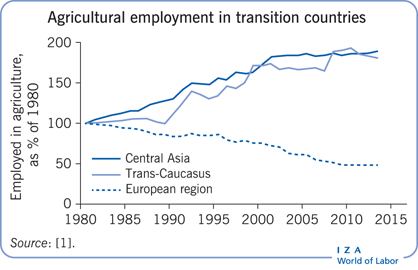Elevator pitch
The increase in agricultural employment in Central Asia and Trans-Caucasus over the last two decades has had a detrimental effect on agricultural labor productivity and rural family incomes. Transition countries in the former USSR cannot, however, encourage exits from agriculture (as, for instance, in east Germany or the Czech Republic) due to the risk of mass rural–urban migration, which may exacerbate growing urban unemployment. With large rural populations, state budgets would be unable to deal with a new wave of unemployed in urban areas.
Key findings
Pros
Self-employment in agriculture guarantees low levels of rural unemployment.
Subsistence agriculture provides a safety net for the rural population.
Surplus production can be sold for cash to consumers, increasing family income, diversifying income sources, and reducing vulnerability to risk.
Rural family incomes can be increased by adopting productivity-enhancing technologies.
The rural population in the former USSR is characterized by high levels of literacy and adequate formal educational attainments.
Cons
Hidden unemployment in rural areas is rampant, allegedly reducing agricultural labor productivity.
Rural family incomes are substantially lower than urban incomes.
Sale of farm products requires transportation and marketing infrastructure, including covered regional markets with adequate facilities.
Technology adoption requires properly organized agricultural extension services.
Quality of training and existing skills are not always adequate to meet technological requirements.
